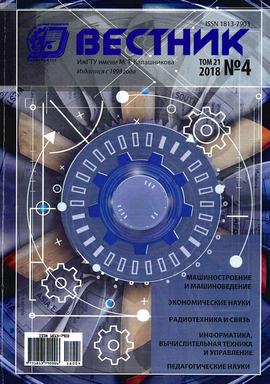Оценка трудоемкости исследовательского труда и норм времени на основе методов и подходов теории сложности и нечеткой логики
DOI:
https://doi.org/10.22213/2413-1172-2018-4-97-101Ключевые слова:
нормирование труда, творческий труд, оценка трудоемкости, теория сложности, нечеткая логикаАннотация
Представлены результаты оценки трудоемкости и норм времени интеллектуального творческого труда на основе теории сложности, позволяющей оценить компетенционную сложность продукта исследовательского труда. В качестве продукта исследовательского, творческого труда предложено считать новые знания, компетенционная сложность которых состоит из сложности знания, новизны знания и коммерческого потенциала. Авторами обоснована возможность использования подходов и принципов теории сложности при нормировании творческого труда с учетом того, что его продуктом являются новые знания. Ввиду целесообразности применения экспертных оценок при определении трудоемкости творческого труда предложено при оценке компетенционной сложности продукта творческого труда использовать методы и подходы нечеткой логики. Построена зависимость трудоемкости исследовательской деятельности от компетенционной сложности, которая позволяет оценить временные затраты, необходимые на реализацию исследовательского проекта с заданной компетенционной сложностью ожидаемого результата. Представлены результаты оценки трудоемкости и нормирования научно-исследовательского труда как творческого труда, и в рамках нечеткой логики сформулированы основные термы, позволяющие учесть специфику и структуру творческой задачи, что дает возможность осуществить количественную оценку в целях дальнейшей монетизации результатов творческого труда.Библиографические ссылки
Галиахметова М. Р., Корецкий В. П., Марданова И. М. Применение методов и подходов теории сложности и нечеткой логики при нормировании и оценке трудоемкости творческого труда // Вестник ИжГТУ имени М. Т. Калашникова. 2016. № 3 (71). С. 41-43.
Кушнир А. Б. Особенности творческого труда в вопросах его нормирования // Вестник НИИ труда. 2010. № 23 (34). С. 64-66.
Боташев Р. А. Проблемы и пути совершенствования системы норм и нормативов труда в инновационной экономике // Политематический сетевой электронный научный журнал Кубанского государственного аграрного университета. 2011. № 71 (07). URL: http://ej.kubagro.ru/2011/07/pdf/15.pdf (дата обращения: 22.08.2018).
Теория сложности / Ю. С. Шарин, Б. А. Якимович, В. Г. Толмачев, А. И. Коршунов. Ижевск : Изд-во ИжГТУ, 1999. 132 с.
Richardson W. J. Measurement of indirect work using multiple regression. The International Journal of Production Research, 1971, vol. 4, no. 4, pp. 301-312.
Ибрагимов А. У., Ибрагимова Л. А., Караваева М. В. Оценка компетентности персонала торгового предприятия с использованием метода нечеткой логики // Вестник Самарского государственного аэрокосмического университета. 2012. № 1 (32). C. 242-249.
Шевченко Н. Ю. Использование нечеткой логики при управлении трудовыми ресурсами организации // Экономические науки. Управление трудовыми ресурсами. URL: http://www.rusnauka.com/ 11_EISN_2011/Economics/5_85009.doc.htm (дата обращения: 14.08.2018).
Дурнев Р. А., Жданенко И. В. Оценка трудоемкости НИОКР: зависимость трудоемкости от показателей качества // Современные наукоемкие технологии. 2013. № 12. C. 40-48.
Дурнев Р. А., Жданенко И. В. Проект методики оценки трудоемкости и стоимости научно-исследовательских и опытно-конструкторских работ // Современные наукоемкие технологии. 2014. № 1. С. 19-28.
Карякин А. М., Грубов Е. О. Подход к определению трудоемкости научно-исследовательских и опытно-конструкторских работ в энергетике с помощью нечетких экспертных оценок // Вестник ИГЭЭУ. 2012. № 3. C. 55-60.


